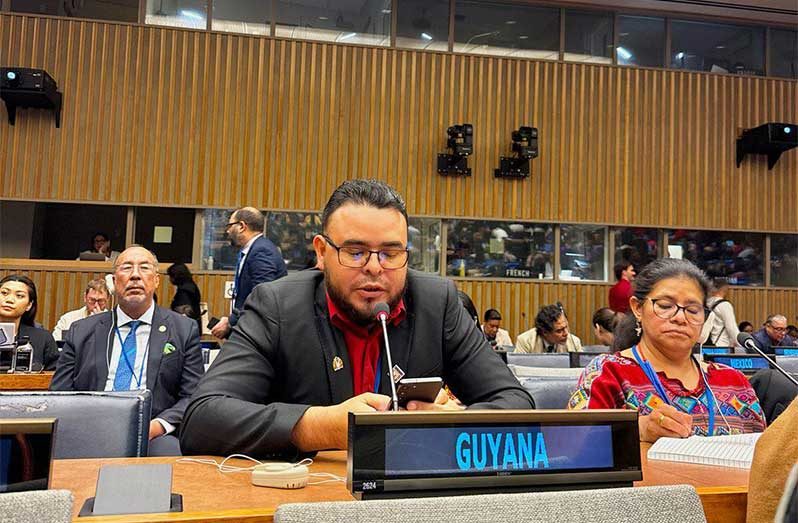At the 24th Session of the United Nations Permanent Forum on Indigenous Issues, Guyana took centre stage as a model for inclusive and effective Indigenous financing. Representing the country was Mr. Shane Cornelius, Toshao (village chief) of Karrau Village and Secretary of the National Toshaos Council, who delivered a powerful address during a thematic dialogue on Indigenous Peoples’ financing and participation.
In his remarks, Mr. Cornelius underscored the vital partnership between the Government of Guyana and its Indigenous communities, which represent approximately 10 per cent of the population.
He emphasised that Indigenous financing is a core pillar of national development policy, highlighting three major mechanisms that have been instrumental in empowering Indigenous communities.
Cornelius explained that financial resources are allocated annually through the national budget to support development in all Indigenous communities.
These funds target essential areas such as health, education, infrastructure, food security, and economic development, with a specific focus on women and youth.
Through Guyana’s Low Carbon Development Strategy (LCDS) 2030—endorsed by all elected Indigenous leaders—a guaranteed 15 per cent of forest carbon credit revenues are directed to Indigenous villages. “Over the past two years, more than USD 45 million has gone directly to communities,” Cornelius
stated, noting that over 1,500 community-driven projects have been funded using Free, Prior, and Informed Consent (FPIC) processes.
The National Toshaos Council (NTC), the country’s highest Indigenous representative body, has seen a 200 per cent increase in government subvention in just two years. The Council also partners with international organisations to implement grassroots projects, including the development of Village Sustainable Plans designed by and for the communities.
“These financing models demonstrate that Indigenous Peoples are not just passive recipients, but active leaders in national planning and development,” Cornelius said.
While highlighting these successes, Cornelius also voiced concern over certain unelected groups that, he said, falsely claim to represent Indigenous interests in Guyana in order to attract international funding—funds that do not benefit Indigenous communities. “These groups do not consult the National Toshaos Council, which includes all elected Indigenous leaders,” he stated, registering the Council’s formal concern with the UN Forum.
In closing, Cornelius urged international and regional stakeholders to scale up support for financing models that place resources directly into the hands of Indigenous Peoples, trusting them to lead their own development efforts.
“Our experience in Guyana proves that when Indigenous Peoples are supported and trusted to lead, the outcomes are transformative—for our communities and for the nation as a whole,” he concluded.



.jpg)









